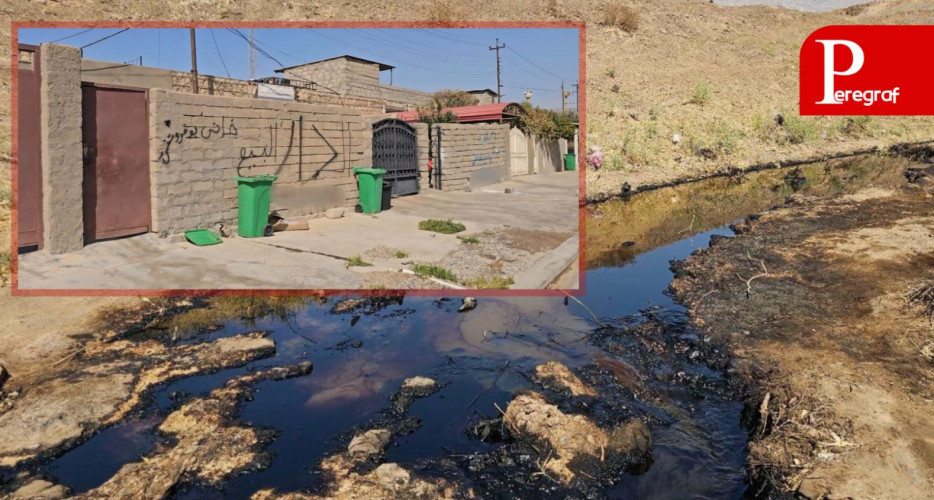
Peregraf – Duhok
Idris Hassan has had "For Sale" written in large letters on the wall of his house for some time, but no one asks about it. His house is near the oil refineries in Duhok.
Dozens of houses in the Bastike and Kwashi areas of Semel district of Duhok province have been put up for sale, some at reduced prices. A number of refineries are operating there, daily emitting black poison and unpleasant odors.
"We don't call them refineries; these are factories for spreading poison among the poor and low-income people," Idris told Peregraf in the Bastike community, expressing his anger and concern that they are forced to migrate and no one is buying their homes.
Black smoke often covers the sky of Bastike and Kwashi, with a sharp and annoying smell. In addition, black waste and liquid residues from the refineries have formed channels in the soil of the area.
"If someone buys my house, I will definitely sell it, because the refineries have crossed all lines, and people have completely lost hope in the relevant authorities to permanently close the refineries," Idris said. He added that they couldn't turn on their air conditioners throughout the hot season because the smell and smoke would be drawn into their homes, so "most of the people" want to sell their homes and leave.
Citizens have lost hope in the closure of the refineries, so they are migrating. For example, more than 10 high-level decisions have been issued to close the illegal refineries in Kwashi, the last decision being in 2021.
All illegal crude oil refineries in Duhok—more than 45 refineries—were located in the Semel district, especially in Kwashi village. Some of them are still secretly and some openly operating, despite years of government decisions and pressure from the provincial administration to permanently close them.
Saleh Ramazan, the Mukhtar of the Bastike community, told Peregraf, "Until now, there are still bad smells and smoke from the refineries and other companies, which has greatly annoyed the people of the area. Therefore, if possible, some people will move their homes," without any government body following up on the matter.
According to Peregraf's follow-up, more than 40% of the families residing in the Bastike community in Semel want to move, out of a total of 360 families. Also, residents of Kwashi, Asihe, Balqos, Misirik, and several other villages intend to migrate.
Not just once, as Ramazan said, they have requested dozens of times for the refineries to be closed so that the people of the area can be rid of the bad smell and smoke, but the problem remains unresolved.
According to previous investigations by Peregraf, the operation of illegal and small refineries has clear and obvious effects on the climate and soil near their locations. This is not hidden from the government and relevant environmental departments and has been discussed many times.
Polluting the environment and climate of Kurdistan is subject to severe penalties under Law No. 8 of 2008 on environmental protection and improvement, which includes imprisonment and fines of up to 200 million dinars, depending on the type and method of violation.
Near the refineries, for example in Bastike, if the price of land and a house was previously $40,000, now the price of the same property does not even amount to half of that, according to Khalid Yusuf, an expert in real estate buying and selling.
"The problem of the smell and smoke from the refineries has forced people to sell their homes. Many people have registered their homes with real estate offices to sell them, but no one is buying," Khalid told Peregraf. He explained that they have suffered twice: on one hand, house prices have dropped significantly, and on the other hand, the refineries have caused health damage and constant annoyance to people.
Of the 45 refineries that were in Duhok, some have stopped working after the closure decisions, but according to Peregraf's follow-up, at least 10 refineries are still operating.
Mohammed Tahir, former director of the Duhok Environment Department and still an employee in the same department, says that for a while, the Kwashi refineries were completely closed, but when they learned that Erbil's refineries were still operating and only those in Duhok were closed, they did not accept it and resumed operations.
"Very senior officials are behind these refineries; it is very difficult to close them," Tahir stressed to Peregraf, explaining that the problem of these refineries is hard to solve because they originally operate under the guise of block factories, sponge factories, and many other fields. When the problem is not solved, people are forced to sell their homes and leave.
Peregraf tried to contact Dilshad Abdulrahman, the director of Duhok Environment, but the attempts were unsuccessful.
Environmental organizations have repeatedly called for the closure of illegal refineries and the adherence of factories to environmental guidelines, but the situation remains the same, even though scientific studies show that environmental and air pollution are major causes of cancer.
Khalil Mahmoud, the Mayor of Semel district, told Peregraf about the latest developments for closing the refineries, "I also don't know whether the refineries are still working or not." He also said that a committee has been formed at the provincial administration level specifically for the refinery issue and will take whatever measures are necessary.
The legal battle and decisions between the government and the refineries are not new; they have been repeated many times since 2010. Each time, a series of measures has been issued, but the refineries are still operating.